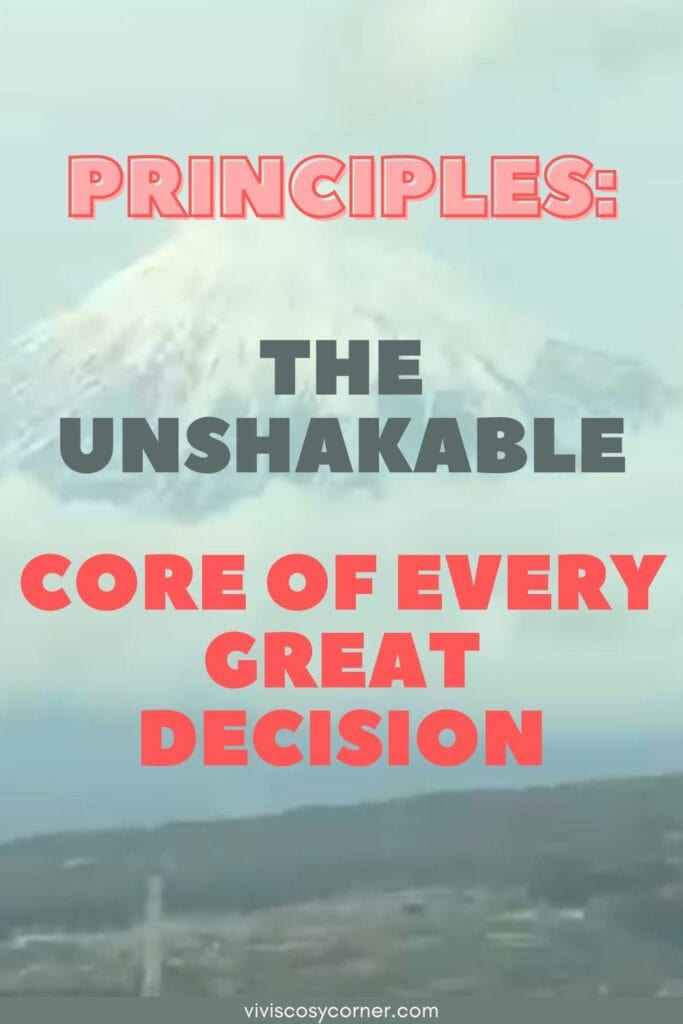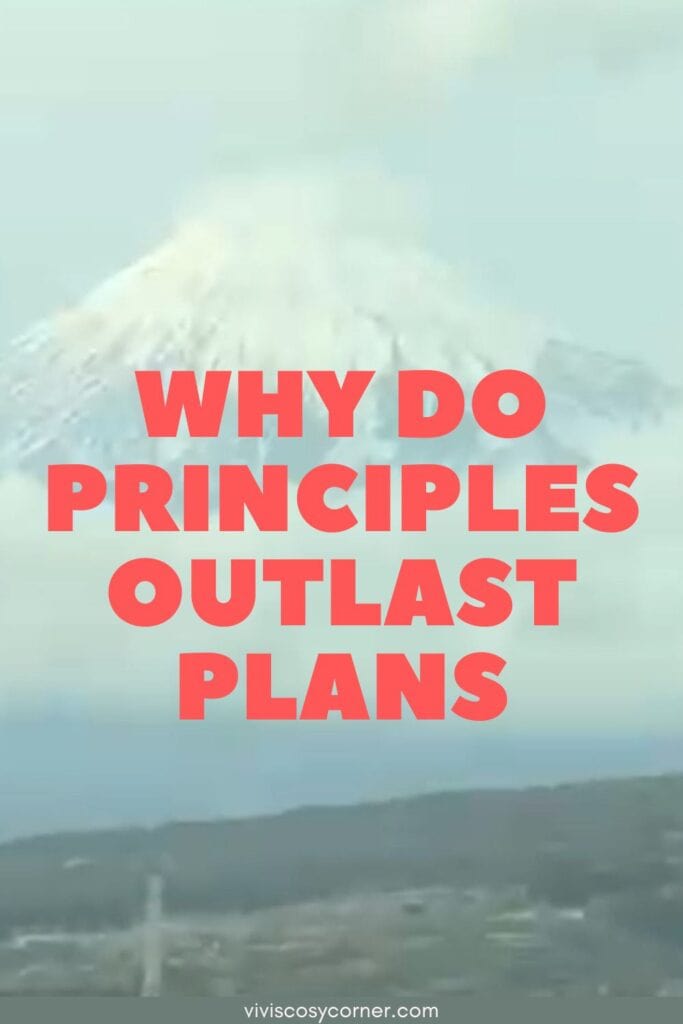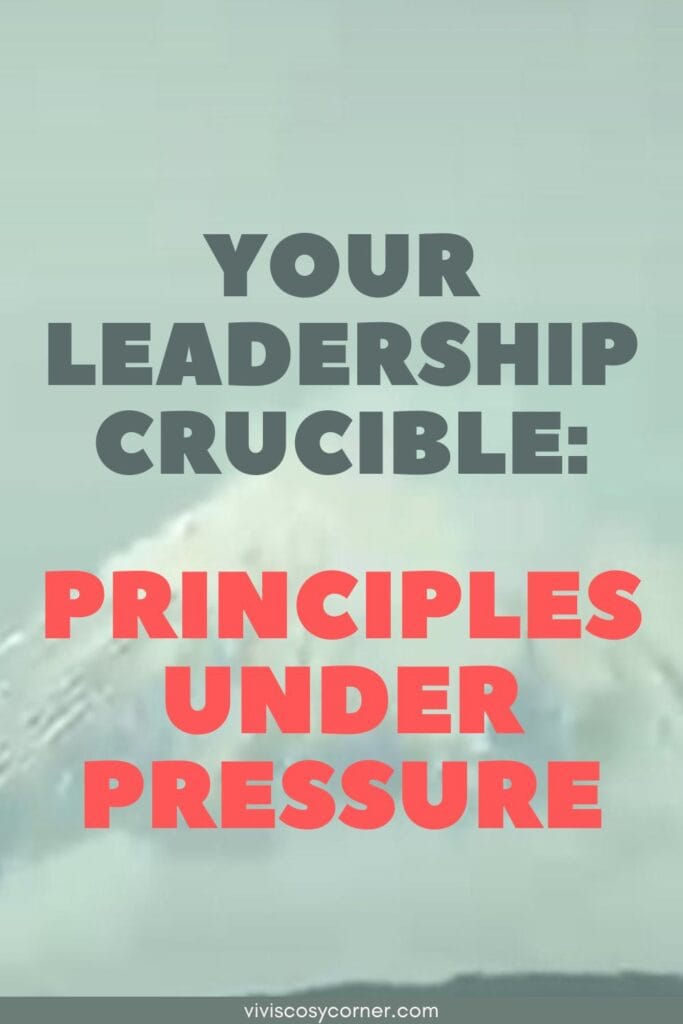
Life doesn’t come with a roadmap. At every crossroad, from boardroom dilemmas to parenting choices, one thing separates those who waver from those who move forward with confidence:
Principles.
Not inspirational posters. Not corporate buzzwords. But the living breathing code that answers when you ask: “How will I know what to do when everything feels uncertain?”
The secret: The most impactful leaders, whether running nations or raising families, don’t make better decisions. They make aligned ones.
When Jeff Bezos installed the compass for Amazon’s “Obsess over customers”, it became the filter for every hire, product, and pivot.
Your principles work the same way:
- They turn “What should I do?” into “What would the best version of me do?”
- They replace endless deliberation with instinctive clarity.
- They build trust because people can predict your north star.
The question isn’t whether you need principles. It’s: Have you defined yours clearly enough that they’d guide you through your next crisis?

Why Do Principles Outlast Plans
Plans fail. Markets crash. Unexpected storms or Pandemics hit.
In a crisis, your mind becomes the hardest thing to manage, and yet it is the most critical. Crisis demands actions, but your principles move you in the right direction.
Why?
Because
- Principles are your compass – When every decision feels urgent, principles cut through the noise. No deliberation, just alignment.
- Principles model what matters – People crave humanity in crisis, not just efficiency. Compassion, authenticity, and empathy become your leadership currency.

Businesses That Led with Principles (And Thrived)
Airbnb’s Masterclass in Dignity
During the 2020 layoffs, CEO Brian Chesky didn’t just cut costs, he wrote:
“We are collectively living through the most painful crisis of our lifetime… As I have learned these past eight weeks, a crisis brings you clarity about what is truly important.”
Then Airbnb:
- Extended healthcare,
- Offered job placement support,
- Let employees keep equity.
Result: A letter so principled, it turned readers (like me) into loyal customers.
Patagonia’s 1% Gambit
When critics scoffed at donating 1% of sales for the preservation and restoration of the natural environment, Patagonia doubled down, then launched 1% for the Planet to drag other businesses along.
Result: A cult-like customer base and talent pipeline that outlasts trends.
Amazon’s North Star
Jeff Bezos’ 1997 Shareholder letter didn’t just outline strategy – it declared Amazon’s soul:
“We will continue to focus relentlessly on customers, not competitors.” This wasn’t corporate fluff. It was a filter for every decision.
Result: It birthed Prime and reshaped retail. Shareholders became partners in this vision.
Microsoft’s Renaissance
Satya Nadella’s “Learn-it-all” revolution replaced the arrogant “know-it-all” culture with curiosity – reviving innovation, and fuelling Azure’s meteoric cloud dominance.
When Values Saved Lives
Johnson & Johnson’s $100M Recall
The 1982 Tylenol Crisis when cyanide-laced pills killed seven people, their “Patients first” credo meant recalling every bottle (31 million) – no cost-benefit analysis. This success story became the benchmark on why values matter.
Finland’s Education Revolution: Why Play, Trust & Equity Create the World’s Top Students
While most education systems race to standardize, Finland chose a radical principle: Childhood isn’t a rehearsal for adulthood, it’s a foundation.
Their winning formula:
- Play-Based Learning Until Age 7 – Builds social skills, resilience and joy in learning.
- Autonomous Teachers – No homework policy, no standardized testing, just trusted professionals.
- Equity as Policy – Free meals, counselling, and individualized support for all.
The Results speak for themselves: Finland is ranked #8 Globally in Education (World Top 20 Project Network 2025); High literacy rates in Europe; Happiest students in OECD rankings.

Make Principles Your Decision Filter
- Define Your Non-Negotiables
- For a small business: “We will never cut product quality to save costs.”
- For a teacher: “Every child deserves patience, not just high scores.”
- For a parent: “Our home is a judgment-free zone.”
- For a restaurant owner: “We never compromise ingredients – food is love.”
- For a small business: “We will never cut product quality to save costs.”
- Stress-Test Every Choice
- “Does this align with who we are at our best?”
- “Does this align with who we are at our best?”
- Communicate Them Early and Often
- Nonprofit leader: “Our donors trust us because we publish every dollar’s impact.”
- Freelancer: “I charge fair rates because sustainable work beats quick gigs.”
- Nonprofit leader: “Our donors trust us because we publish every dollar’s impact.”
- Let Principles Drive Reinvention
- Local Bookstore Pivot: When Amazon threatened, one shop’s “community first” principle led to curated subscriptions and author events, outselling algorithms with human connection.

Your Leadership Crucible: Principles Under Pressure
When storms hit, principles aren’t just guidelines, they’re lifelines. Here’s how to forge yours:
- Write to your imaginary stakeholders (even if your “stakeholders” are just your kids or team):
- “Here’s what we will never sacrifice, even if it costs us…”
- “Here’s what we will never sacrifice, even if it costs us…”
- The 3 AM Test – For every tough call:
- Will this let me sleep soundly at night?
- Does this honour who we are at our core?
- What would the most compassionate leader do?
- Will this let me sleep soundly at night?
- Friday Firewall – Set a weekly alarm to ask:
- Where did I bend my values this week?
- What small win aligned with my principles?
- Where did I bend my values this week?

When Chaos Comes (And It Will)
- Pause before reacting (take at least 3 breaths)
- Filter choices through your “stakeholder letter”
- Ask: “Is this solution fast… or is it right?
“Principles aren’t for the easy days. They’re for the days when every instinct screams ‘cut corners.”
What’s one principle you’ve held onto, even when it cost you? Share below. Let’s learn from each other.
Thank you for being a VCC reader.

